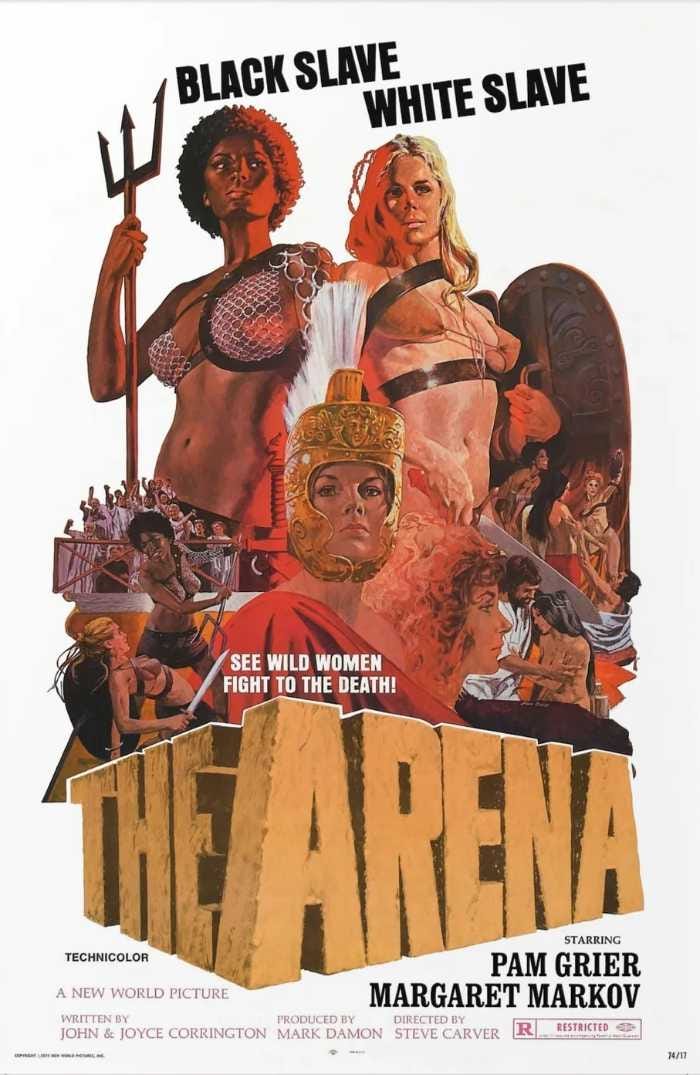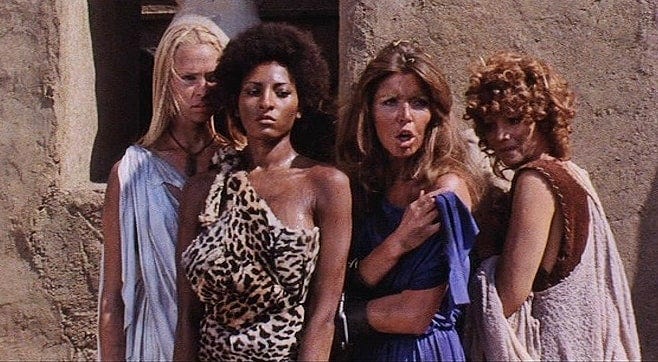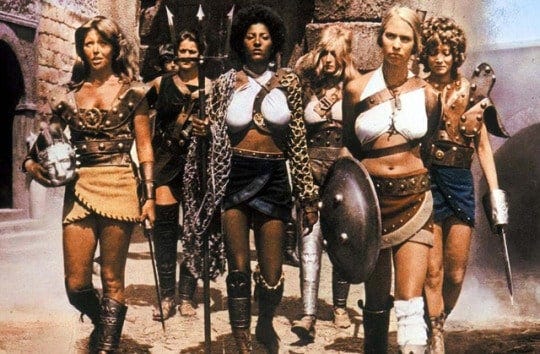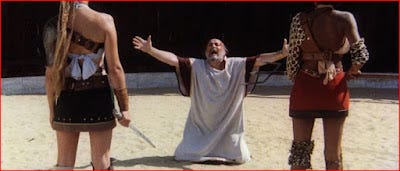Blaxploitation Education: The Arena
Pam Grier does her best to give a cheap gladiator movie a Blaxploitation edge.
The Arena
Written by John William Corrington and Joyce Hooper Corrington
Directed by Steve Carver
1974
As I watch as many movies as I can that are at least tangentially connected to the Blaxploitation scene, it’s been kind of a whirlwind tour of the different types of “B” movies being made in the 1970s, from schlock horror to women-in-prison to men’s adventure. While some of these could be considered part of the Blaxploitation movement due to their emphasis on societal issues that affected Black audiences, others were clearly low-budget exploitation movies that tried to get on the bandwagon by putting the word “Black” in the title and adding one or two Black characters to their casts. The Arena sort of fits into that mold, being a gladiator movie that features Pam Grier, but it arguably has some Blaxploitation-esque themes, although you do have to squint a little bit to see them.
Grier is joined here by her Black Mama, White Mama co-star, Margaret Markov, and the two of them turn in much better performances than they had in the earlier picture, which I found to be almost instantly forgettable. Markov plays Bodicia, who we’re introduced to in the opening scene, where she seems to be some sort of Druid priestess involved in a ritual that gets rudely interrupted by some Roman soldiers who take her into captivity. That’s followed by a scene set in Africa where Pam Grier’s character, Mamawi, is dancing to some drums and flutes being played by her fellow tribesmen before she is likewise attacked and captured. Next thing we know, the two of them and a couple other women are being sold into slavery in the Roman city of Brundisium.
They’re bought by a decadent doofus named Timarchus (Daniel Vargas) who runs the local gladiator arena, and at first, they’re just servants who serve wine and mop up the blood after the battles are over. But Timarchus is having trouble keeping the crowds entertained, so after a catfight between all the women servants totally wrecks his kitchen, he seizes on the idea of having women fight as gladiators. And thus, we get the real reason for this movie: put good-looking women in sexy battle gear and have them fight each other violently. It’s a formula that audiences still line up for, if the ongoing popularity of women’s boxing, MMA, and professional wrestling is any indication.
The movie takes its time getting to the good parts, but that’s probably because the budget was so low that it had to save the actual entertaining action for the climax. On the way there, there’s some drama about how the women become attached to some of the gladiators (both Bodicia and Mamawi get chosen to “serve” some of the competitors the night before a big battle) before being devastated when they die in the arena. The head gladiator, a beefy bald guy named Septimus (Pietro Ceccarelli) is in love with a woman named Lucinia (Mary Count), and the comic relief is provided by a woman named Diedre (Lucretia Love) who seems to be perpetually drunk on wine she drinks instead of serving.
When the women do finally get to fight, the first battle is kind of ridiculous and pointless, since Bodicia easily defeats Diedre, and the crowd is so entertained that Timarchus gives the thumbs-up that allows Diedre’s life to be spared. Things don’t turn out so well when Mamawi has to fight Lucinia, and after disarming her, she’s given the thumbs-down that will force her to finish Lucinia off. She doesn’t want to do so, but Timarchus forces her hand by threatening to have his archers shoot her if she doesn’t comply.
This leads the women to make an escape attempt with the help of Septimus. Unfortunately, he’s so overcome with grief and rage at the death of Lucinia that he attempts to murder Timarchus in his sleep, and when he’s caught, he gets crucified for his troubles. Without Septimus’ help, the women are forced to give up on their escape plan, and Bodicia and Mamawi have to fight each other the next day.
My description of this may sound fairly exciting, but it’s kind of a slog, with too little action in the arena and little in the way of character development during the off-hours. There’s a slight bit of attention paid to whether Mamawi is going to join the others in an attempt to throw off the yoke of their oppressors or whether she’s only out to save herself. But aside from some moping about the men they briefly got to spend some time with before they died, that’s about the extent of the drama.
Fortunately, things pick up when the time for the final battle comes. Bodicia and Mamawi have a pretty good fight, and when Mamawi is once again put in the position of being forced to kill her opponent, she refuses to do so. But before Timarchus can order his men to fire on her, some of the other slave women pull out bows and start firing at his soldiers. Soon enough, it’s chaos in the arena, with people being thrown in the pit and left to the mercy of the contestants, the male gladiators entering the fight, and a bunch of Roman soldiers showing up to try to put down the uprising.
This all gets pretty exciting, and both Grier and Markov get to look pretty badass as they fight off various attackers. They also get to kill Timarchus, which is a satisfying end for a rich snob character who is reduced to a sniveling weakling begging ineffectually for his life. It seems kind of unrealistic that a couple of women who picked up weapons for the first time a few days ago would be able to defeat a bunch of trained Roman soldiers, but calling for realism in a movie like this is a fool’s errand. In the end, they manage to escape due to their willingness to fight to protect each other, and they get a nice “walk off into the sunset” ending.
As a product of Roger Corman’s New World Pictures, this is definitely a cheapie, and probably one that was thrown together without too much emphasis on making sure the script was solid. So it’s probably a stretch to claim that it was attempting anything in the way of social commentary like other Blaxploitation movies. However, it does at least call to mind the ways slavery and servitude can be dehumanizing, forcing the oppressed to worry so much about their own survival that they struggle to work together to try to regain their freedom. If I really wanted to reach, I could try to come up with something about how the popularity of the gladiators and their ability to finally stand up to the guy who was oppressing them is similar to the growing popularity of Blaxploitation and the excitement of seeing Black heroes defeat white villains. But I don’t think I need to go that far.
Instead, I’ll highlight one other interesting element: a woman named Livia (Marie Louise) who is a Roman citizen who had been sold into slavery. She spends the movie siding with the Romans who are enslaving them and acting like she is superior to the women who are foreigners. But of course, to the enslavers, she’s just another slave. It seems that the movie accidentally stumbled into some commentary on the way some white people are willing to accept oppression by those who are rich and powerful as long as they can feel superior to other races.
I can’t claim that this movie is especially insightful, but it’s nice that it provided me with at least a little bit of food for thought in the midst of its violence and the sprinkling of nudity and sex that it provided throughout (including a few distasteful scenes of sexual assault of the style that tended to show up in movies like this, which is a trend that I’m glad has been left in the past). But really, seeing Pam Grier be a total badass who kills multiple people with a trident is enough to sell me on this movie, so other elements of interest just serve as extra frosting on top.
Blaxploitation Education index:
UpTight
Cotton Comes to Harlem
Watermelon Man
The Big Doll House
Shaft
Sweet Sweetback’s Baadasssss Song
Super Fly
Buck and the Preacher
Blacula
Cool Breeze
Melinda
Slaughter
Hammer
Trouble Man
Hit Man
Black Gunn
Bone
Top of the Heap
Across 110th Street
The Legend of N***** Charley
Don’t Play Us Cheap
Shaft’s Big Score!
Non-Blaxploitation: Sounder and Lady Sings the Blues
Trick Baby
The Harder They Come
Black Mama, White Mama
Black Caesar
The Mack
Book of Numbers
Charley One-Eye
Ganja & Hess
Savage!
Coffy
Shaft in Africa
Super Fly T.N.T.
Scream Blacula Scream
Cleopatra Jones
Terminal Island
Gordon’s War
Slaughter’s Big Rip-Off!
Detroit 9000
Hit!
The Spook Who Sat by the Door
The Slams
Five on the Black Hand Side
The Black 6
Hell Up in Harlem
I Escaped From Devil’s Island
Blackenstein
The Bad Bunch
That Man Bolt
Willie Dynamite








"Soon enough, it’s chaos in the arena, with people being thrown in the pit and left to the mercy of the contestants, the male gladiators entering the fight, and a bunch of Roman soldiers showing up to try to put down the uprising."
From what I can see, this film, with some tweaking of the script, could have very easily been played for laughs, a la Monty Python's "Life of Brian" and the Roman section of Mel Brooks' "History Of The World, Part 1." I can imagine Livia taking the pro-side of a "What have the Romans ever done for us?" argument, and Brooks was a master of chaotic climaxes like the one here.